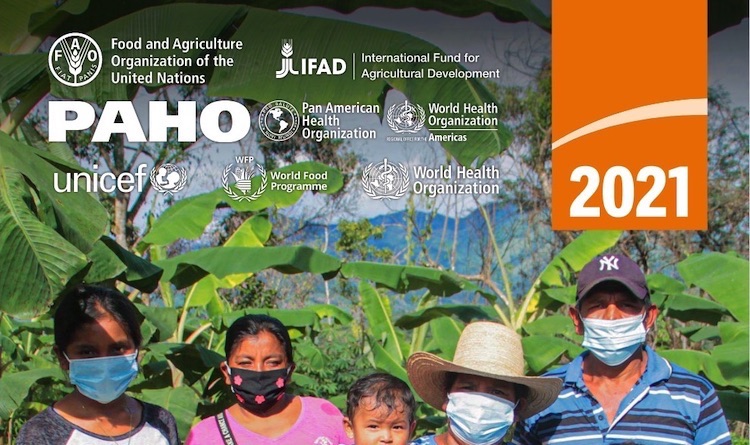By Jaya Ramachandran
ROME (IDN) — The rise in hunger and food insecurity levels that have been occurring in Latin America and the Caribbean since 2015, were exacerbated by the effects of the COVID-19 pandemic. The region is now even further off-track to achieve Sustainable Development Goal (SDG) target 2.1 to end hunger and achieve food security, according to the latest Regional Overview of Food Security and Nutrition.
The report is a joint publication of the Food and Agriculture Organization of the United Nations (FAO), the International Fund for Agricultural Development (IFAD), the Pan American Health Organization/World Health Organization (PAHO/WHO), the World Food Programme (WFP), and the United Nations Children’s Fund (UNICEF).
The report points out that hunger and food insecurity rose more sharply in Latin America and the Caribbean than in any other region in the world. The number of people living with hunger in Latin America and the Caribbean increased by 13.8 million, reaching 59.7 million people (9.1 per cent of the population) in 2020. That was a 30 per cent increase, or 13.8 million additional people, compared to 2019.
Also, four out of every ten people in the region—267 million—experienced moderate or severe food insecurity in 2020, 60 million more than in 2019, an increase of nine percentage points, the most pronounced rise in relation to the other world regions.
The report warns that the region is also losing the battle against other forms of malnutrition. 106 million people—one in every four adults— suffer from obesity and, in 2020, 3.9 million children—7.5 per cent of those under five years of age—were overweight.
It also reported an increase in food insecurity, stating that 41 per cent of the region’s population is “moderately or severely food insecure, which translates to 267 million people whose human right to food is not being met”.
In South America, the number of those suffering from hunger increased by 18 million people between 2014 and 2020. However, the report says half of the increase, an estimated 9 million people, “occurred between 2019 and 2020 in the context of the COVID-19 pandemic”.
“This suggests an increase of 36 per cent in the number of people living with hunger in just one year,” it says.
Among the countries with the highest numbers of people suffering from hunger in Latin America and the Caribbean are Haiti, Venezuela, Guatemala and Nicaragua.
The report also states that the COVID-19 pandemic has “exacerbated” the problem of hunger, food insecurity and malnutrition, due to the fact that it has “reduced the incomes of millions of people in the region”.
“However, the pandemic alone is not responsible for all these setbacks, as the regional statistics for hunger have been increasing for six consecutive years,” the report says.
In a statement Julio A. Berdegué, the UN Food and Agriculture Organization’s regional representative for Latin America and the Caribbean, has called for action to stem the growing trend.
“We must say it loud and clear: Latin America and the Caribbean (are) facing a critical situation in terms of food security,” he says. While the number of those who suffer from hunger increased, the report also stated that in other parts of the region, the battle against other forms of malnutrition, including obesity, is being lost.
In Latin America and the Caribbean, an estimated 106 million people, or one in every four adults, suffer from obesity. Between 2016 and 2020, the prevalence of obesity increased 9.5 per cent in the Caribbean, 8.2 per cent in Mexico and Central America and 7.2 per cent in South America.
Furthermore, the number of overweight children continues to rise, with an estimated 3.9 million obese children, 7.5 per cent of whom are under 5. The number, the report says, is nearly 2 per cent above the world average.
The report says that the new statistics will contribute to “policy dialogue for post-pandemic recovery, which is fundamental to closing gaps in equality and meeting the goals of the 2030 Agenda for Sustainable Development”.
“We cannot reverse these trends unless we transform our agri-food systems to make them efficient, resilient, inclusive and sustainable enough to provide a healthy diet for everyone, leaving no one behind,” the report says.
In Latin America and the Caribbean during 2020, moderate or severe food insecurity affected 40.9 per cent of the population, well above the prevalence recorded at the world level (30.4 per cent). Between 2014 and 2020, moderate or severe food insecurity rose by 16 percentage points. More than half of that increase occurred in the last year alone, in the context of the COVID-19 pandemic, as prevalence rose from 31.9 per cent
to 40.9 per cent, representing an increase of 9 percentage points, the most pronounced in relation to other regions of the world. [IDN-InDepthNews – 06 January 2022]
Image credit: UN
IDN is the flagship agency of the Non-profit International Press Syndicate.
Visit us on Facebook and Twitter.
This article was produced as a part of the joint media project between The Non-profit International Press Syndicate Group and Soka Gakkai International in Consultative Status with ECOSOC on 06 January 2022.


